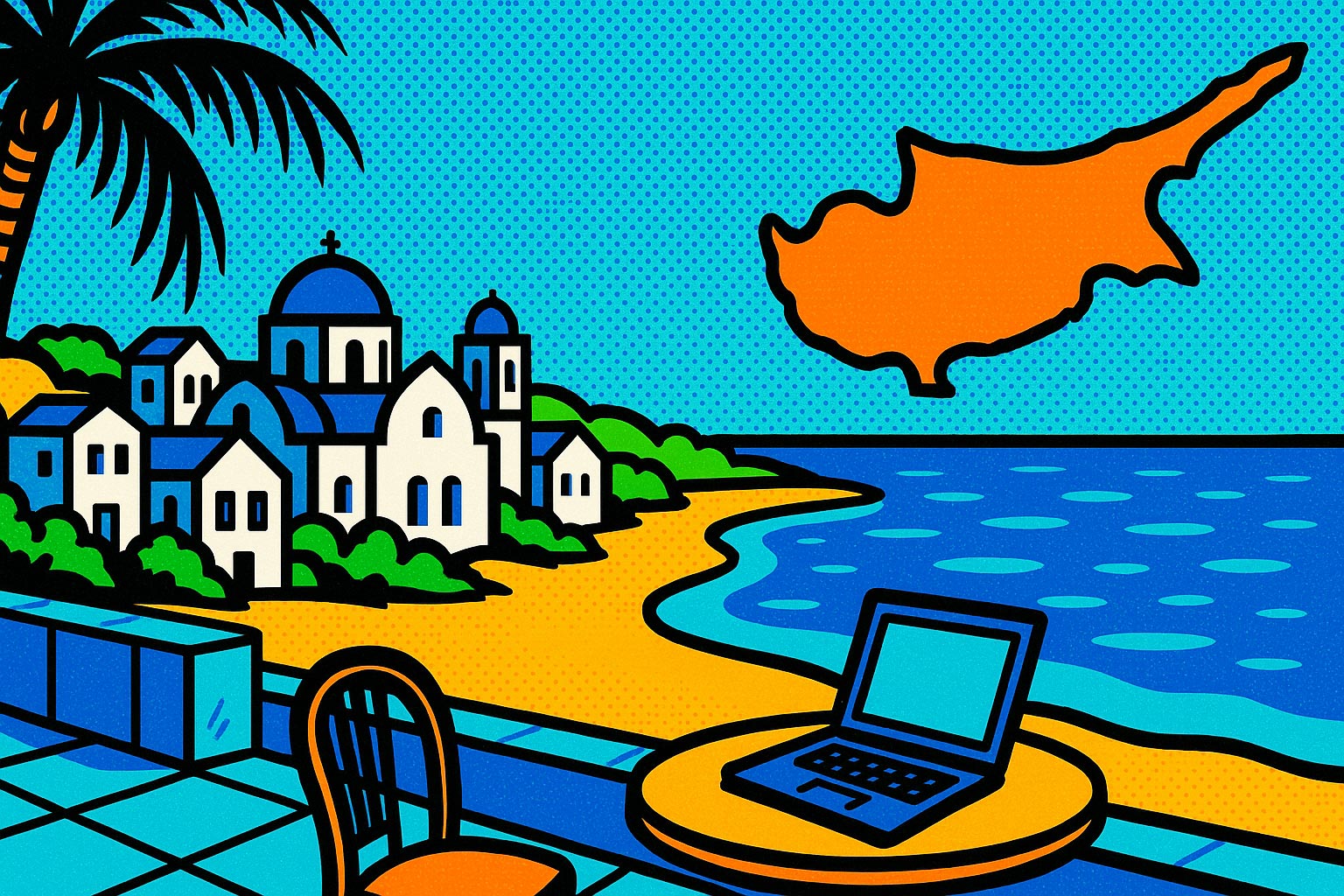- 1. Why Cyprus Is the Perfect Base for Digital Nomads
- 2. Entry Routes & Residency Options for Remote Workers
- 3. Cyprus Taxes for Remote Workers: Keep More of Your Income
- 4. Setting Up Your Freelance or IT Business in Cyprus
- 5. Cost of Living & Daily Expenses
- 6. Where to Live & Work Remotely in Cyprus
- 7. Pro Tips for Thriving as a Location‑Independent Professional
- 8. Pack Your Laptop, Lower Your Tax—See You in Cyprus!
- 9. Digital Nomad Cyprus FAQ
- 10. Author
Cyprus blends 300 plus days of sun, year‑round sea swims and a bustling tech scene into one irresistible offer for location‑independent professionals. The island’s gigabit fibre, country‑wide 5G coverage and relaxed Mediterranean pace are already powerful draws; combine them with one of the friendliest personal‑tax regimes in the European Union and it is no surprise that the phrase digital nomad Cyprus keeps trending on Google. Below you will learn exactly how to base yourself here, keep your clients happy and legitimately reduce your tax bill—without drowning in bureaucracy.
Why Cyprus Is the Perfect Base for Digital Nomads
Cyprus sits at the crossroads of three continents yet operates in the eurozone and under familiar EU consumer‑protection rules. English dominates in business, public signage and everyday service interactions, removing an early barrier to entry faced in many other hot destinations. The cost‑to‑value ratio remains compelling: you can grab a double espresso with sea views for the price of a drip coffee in Lisbon, while apartment rents outside Limassol’s beachfront still undercut Barcelona.
Infrastructure geared for remote work Cyprus goes well beyond café Wi‑Fi. Urban areas offer symmetrical fibre up to 1 Gbps, and all major telecom providers deliver unlimited 5G data SIMs for under €35 per month. Larnaca and Paphos airports receive multiple daily low‑cost flights from Western Europe, and the island’s compact size means you can finish a morning snorkel and still be at your co‑working desk by nine.
The lifestyle payoff is equally powerful: mild winters invite lunchtime hikes in the Troodos mountains, while a thriving international community of IT engineers, traders and content creators guarantees peer support after hours.
Climate & Everyday Lifestyle Perks
- Outdoor living twelve months a year: paddle‑board before breakfast, ski in February on Mount Olympus.
- Top‑three EU countries for safety according to Eurostat statistics; petty crime rates remain low in all cities.
- Active expat networks organising language exchanges, trail‑clean‑ups and beach volleyball leagues every weekend.
Connectivity, Co‑working & Digital Services
- Tier‑IV datacentres and redundant Mediterranean fibre landings keep latency minimal for global SaaS traffic.
- Well‑equipped co‑working spaces such as Hub Nicosia and Cyfrens Limassol provide 24‑hour access, podcast studios and community managers.
- Local eSIM vendors like MTN Flex allow instant number activation on arrival—ideal for short project sprints.
Entry Routes & Residency Options for Remote Workers
Tourist stamps last 90 days, but serious remote professionals need a sturdier legal footing. Cyprus offers several flexible permits that keep you compliant with immigration laws while unlocking bank accounts and local health coverage. Choosing the correct route depends on your passport, income structure and long‑term goals—from short stints to permanent settlement.
The flagship instrument is the Digital Nomad Visa introduced in October 2021. It caters specifically to non‑EU citizens working for foreign employers or their own offshore entity. If you fall outside those criteria, alternative residency classes still give ample breathing room, including fast‑track investment options that lead to indefinite leave.
Below is a pragmatic breakdown of the two main pathways:
Cyprus Digital Nomad Visa (DNV)
- Prove €3 500 net monthly income (salary or freelance invoices) transferred from abroad.
- Submit private health insurance valid in Cyprus and a clean police record.
- Apply online, then attend a biometric appointment within three months of entry; receive a one‑year residence permit renewable for two.
- Immediate family can piggy‑back on your permit without extra income requirements.
Alternative Routes If You Don’t Fit the DNV Box
Short‑term project? Work the 90/180‑day rule: cuff your Schengen runs to neighboring Greece or Italy and reset. For passive‑income earners, Category F residency demands proof of roughly €40 000 yearly income yet grants life‑long stay with minimal renewal hassle. Investors can inject €300 000 into new property and secure Permanent Residency in as little as 60 business days—handy if long‑term EU access is the endgame.
Cyprus Taxes for Remote Workers: Keep More of Your Income
The phrase Cyprus taxes for remote workers is more than clickbait. By combining the non‑dom regime with low social‑insurance contributions—and, if relevant, the 12.5 % corporate headline rate—you legitimately shave thousands off your annual bill while retaining full EU credibility. Non‑dom status exempts foreign dividends, interest and most capital gains for seventeen years. Meanwhile, income earned from remote employment abroad is tax‑deductible via a 50 % exemption band once your salary exceeds €55 000.
Even without aggressive planning, a foreign‑employed coder based in Larnaca often pays little beyond €1 200 in annual social insurance, yet still taps into state healthcare. The Tax Department publishes clear English guides and responds quickly to email queries—rare transparency in southern Europe.
Below is the promised snapshot of headline regimes:
Key Regimes at a Glance
| Scenario | Requirements | Effective Tax Rate / Relief |
|---|---|---|
| Non‑dom individual | Tax resident ≥183 days; foreign‑source passive income | 0 % on dividends & interest for 17 years |
| High‑earner 50 % exemption | First Cyprus employment, salary >€55 000 | ≈11.5 % blended rate for €60 k salary |
| Cyprus Ltd + IP Box | Qualifying IP income, audited accounts | As low as 2.5 % on qualifying profits |
| Foreign‑employed remote worker | Contract with non‑Cyprus entity | ≈12 % Social Insurance only |
Incentives & Allowances You Shouldn’t Miss
- 0 % tax on worldwide dividends and interest under the non‑dom scheme (17‑year clock).
- Deduct either 20 % of employment income or €8 550—whichever is lower—for the first three years as a new resident.
- Capital gains on crypto and listed securities remain untaxed if the issuer is non‑Cypriot.
“Remote work shifts the talent marketplace from local to global overnight.”
Setting Up Your Freelance or IT Business in Cyprus
Whether you sell code on a per‑sprint basis or run a fully‑fledged SaaS, Cyprus simplifies compliance without strangling innovation. Banking is digital‑friendly—Revolut and Wise both hold EMI licences locally—while accounting automation platforms connect directly to the Tax Department’s TFA portal via API. Local firms charge €800–€1 200 per year for full bookkeeping, lower than Malta or Estonia and miles below UK practitioner fees.
Broad categories exist for sole traders (self‑employed) and limited companies. Self‑employment shines for consultants billing less than €70 000 annually; a limited company unlocks IP box rates and broad tax planning once recurring profits surpass €80 000. The following subsections detail both setups:
Choose wisely; switching mid‑year can trigger retrospective VAT registration and messy reconciliations.
Registering as Self‑Employed
- Visit the Social Insurance District Office with passport and tenancy agreement to receive an Employer Registration Number.
- VAT registration becomes compulsory at €15 600 turnover; apply voluntarily earlier to reclaim input VAT on laptops and co‑working.
- Issue bilingual invoices—English and Greek—to accelerate client payment cycles and mitigate tax reviews.
Launching a Cyprus Ltd for Global, Location‑Independent Income
You can form a company with €1 of nominal share capital and one director—yourself. While nominee services are common, they are not obligatory. Corporate income is taxed at 12.5 %; distributing dividends to a non‑dom shareholder adds zero additional levy. Annual audited financial statements must be filed within twelve months of year‑end, but cloud accounting paired with a licensed auditor keeps the paperwork painless.
Cost of Living & Daily Expenses
Living costs vary by city but remain competitive against other EU sun belts. Groceries track EU averages, yet utilities trend lower thanks to mild winters. Cars dominate suburban life, but intercity buses cost €4 and run hourly. Budget‑minded nomads can land long stays in Larnaca for a third less than Limassol, freeing cash for weekend diving or cowork‑hop passes.
The illustrative budget below assumes a single tenant in a modern studio and a preference for eating out twice weekly. Numbers originate from crowdsourced actuals (Numbeo Q1 2025) and local agency listings.
Use the table as a guideline—prices fluctuate with tourist seasons and personal lifestyle choices.
Monthly Budget Snapshot for a Single Digital Nomad
| Expense | Limassol € | Larnaca € |
|---|---|---|
| Studio rent | 1 050 | 750 |
| Co‑working desk | 220 | 180 |
| Mobile + fibre internet | 55 | 50 |
| Groceries | 300 | 280 |
| Eating out (2×/wk) | 240 | 210 |
| Petrol / Bus | 120 | 90 |
Money‑Saving Hacks Local Nomads Swear By
- Shop municipal markets after 13:00 for half‑price local avocados and halloumi.
- Install a pre‑paid electricity meter and monitor daily kWh consumption to avoid end‑of‑summer surprises.
- Negotiate gym memberships in October—off‑peak deals slash up to 40 % versus January quotes.
Where to Live & Work Remotely in Cyprus
Pick your home base around work rhythm, nightlife appetite and flight frequency. All cities sit within ninety minutes of each other, but micro‑cultures differ sharply. Limassol radiates corporate hustle and yacht‑club champagne; Nicosia leans academic and policy‑driven; seaside Larnaca blends chilled cafés with quick airport dashes.
Digital nomads often test‑drive each for a month before locking longer leases. Car‑sharing services ease exploration, and intra‑city buses have reliable air‑conditioning. Below are the core traits of each hub.
Bookmark them, then decide which energy matches your productivity style.
Limassol: The Business & FinTech Magnet
Limassol’s quayside promenade hosts hedge‑fund managers, affiliate‑marketing masterminds and growing Web3 incubators. Coworking density is the highest on the island, but so are rents, with beachfront studios topping €1 300. The upside: year‑round networking events, from DeFi dinners at Old Port to ProductHunt pitch nights at The Warehouse.
Nicosia: Capital City with Local Flavor
Inland Nicosia blends Byzantine alleyways with glass EU offices. University campuses keep the vibe youthful, and apartment prices remain moderate: €650 nets a one‑bed near the Venetian Walls. Inland summer heat climbs higher than the coast, but air‑conditioned cafés offer refuge. Freelancers appreciate the proximity to ministries for face‑to‑face licensing errands.
Larnaca & Ayia Napa: Laid‑Back Coastal Living
- Five‑minute taxi to Larnaca International Airport—perfect for rapid client visits.
- Emerging “Digital Nomad Village” concept in Ayia Napa testing subsidised coliving complexes.
- Quieter winters mean uninterrupted focus; peak‑season nightlife still reachable on weekends.
Pro Tips for Thriving as a Location‑Independent Professional
Technical competence gets you paid; operational finesse keeps you sane. Cyprus operates on Eastern European Summer Time (GMT+3), offering sweet‑spot overlap with both Asia and North America but demanding deliberate calendar carving. Community integration bridges any island claustrophobia, while a pinch of Greek vocabulary unlocks hidden rental deals.
The guidance below distils hard‑earned lessons from veteran remote managers, indie hackers and crypto quant teams already planted on the island.
Implement one tactic per week, measure impact, iterate—Kaizen beats once‑and‑done overhauls.
Time‑Zone Management & Client Communication
- Stack Asia‑Pacific calls at 07:30—keeps afternoons meeting‑free for deep work.
- Block a 16:00–18:00 slot for US East Coast stand‑ups to finish by 19:00 dinner.
- Adopt async video briefs (Loom, Clip) and shared Kanban boards to cut live calls by half.
Community, Networking & Work‑Life Balance
Local meetup staples include Cyprus Remote Workers and Startup Grind Cyprus. Attend once, speak twice: giving a 10‑minute lightning talk accelerates reputation building. Volunteer beach clean‑ups through NGOs such as Let’s Make Cyprus Green offer productive downtime, broaden networks and polish Greek colloquialisms like “kalimera.”
Finally, respect siesta culture between 13:00‑15:30; schedule demanding code reviews outside that window to harness uninterrupted focus.
Pack Your Laptop, Lower Your Tax—See You in Cyprus!
Cyprus checks every essential box: strategic EU location, sunny micro‑climate, crypto‑friendly banks, and transparent tax incentives that maximise take‑home earnings. From remote work Cyprus rookies to seasoned IT founders, the island delivers an environment where productivity scales and personal expenses do not. Secure your visa, register your taxes, connect to gigabit fibre, then pivot your saved euros towards surf lessons or seed‑funding the next big SaaS idea. Cyprus awaits—laptop in hand, sea breeze at your back, tax man on your side.
Digital Nomad Cyprus FAQ
1. What is the minimum income required for the Cyprus Digital Nomad Visa?
You must prove at least €3 500 net per month after tax, transferred from a foreign employer or freelance contracts. Bank statements and client invoices serve as proof.
2. How long can I keep non‑dom tax status after I move to Cyprus?
The non‑dom exemption on foreign dividends, interest and certain capital gains lasts for 17 consecutive tax years from the moment you become Cyprus‑tax resident.
3. Do US citizens still have to file with the IRS while paying taxes in Cyprus?
Yes. The United States taxes its citizens on worldwide income. File the annual 1040 and claim the Foreign Earned Income Exclusion or a foreign‑tax credit for Cyprus liabilities.
4. Can I invoice clients in crypto and still benefit from Cyprus tax incentives?
Yes, provided you keep euro‑denominated accounting records and report realised crypto gains separately. Non‑dom status currently exempts capital gains on most crypto disposals.
5. Is private health insurance mandatory for remote workers?
Yes for visa issuance; afterwards you may enrol in GESY, the national health system, once you receive a social‑insurance number.
6. Which Cyprus city offers the fastest fibre connections for heavy IT workloads?
Limassol leads with widespread symmetrical 1 Gbps fibre through CYTA and Epic ISPs, closely followed by Nicosia business districts.



